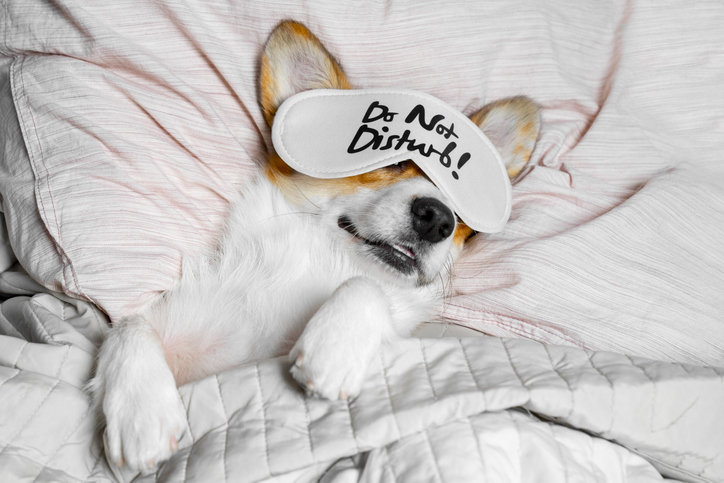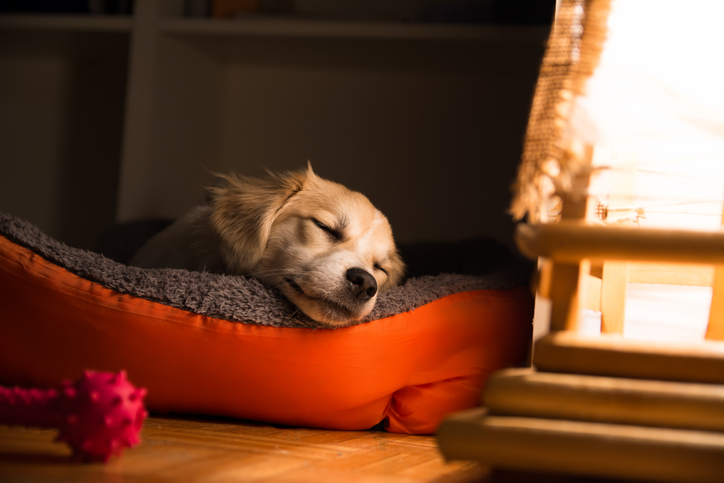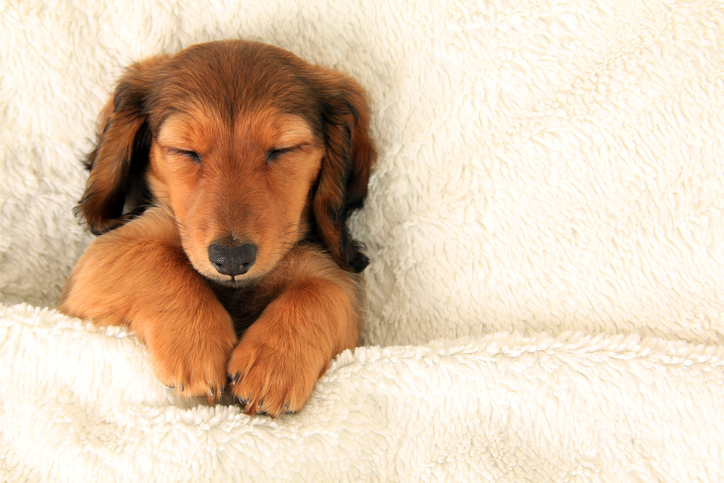How Many Hours Do Dogs Sleep?

by Kelley Kombrinck
Let Sleeping Dogs Lie
Many of us know the old phrase, “The quick, brown fox jumped over the lazy dog.” It’s a sentence that contains all the letters of the English alphabet, but it also paints our favorite furry companions in an arguably negative light. The lazy dog. As if there is some task that dogs should be working on but instead choose to ignore for sleep. We can also probably all visualize the popular image of the sleepy-eyed hound dog snoozing away on some front porch, dream-chasing rabbits contentedly. The truth, however, is that dogs aren’t lazy, they just need a lot of sleep. It’s how they’re built.
So how many hours a day do dogs sleep?

Well, the answer depends on a list of different factors. Breed, size and age play large roles in how long a dog may need to sleep during the day, but there are other less-easily defined variables that can affect this too. Where the dog lives and what the physical environment is like, the people and animals that it lives with, its diet, whether or not it is a “working,” dog—all of these can determine the amount of time a dog will spend sleeping each day.
Most adult dogs tend to sleep anywhere from 8-14 hours every day, averaging somewhere around 10 hours. This might sound like a log of time spent snoozing, but dogs have different needs and different sleep cycles that us humans. While they may spend more hours overall sleeping, dogs’ sleep cycles are shorter than humans. We usually sleep 6-8 hours a day, and each sleep cycle during those hours runs for about two hours. In contrast dogs, who are polyphasic sleepers (meaning their overall sleep is broken up into different times throughout the day) have sleep cycles that last about 45 minutes. They spend less time in REM sleep (the sleep where dreaming occurs) than we do as well. They spend this time most likely dreaming of activities and memories from their day, just as we do, and unless they seem to be in distress, it is good to let them sleep fully through this cycle.
Sleep patterns for dogs can also be disrupted by stressful events, just like humans. A person may notice their dog having trouble getting good consistent rest after a move to a new home, or changes in the family dynamic or schedule. A new baby in the house, a relative visiting from out of town, or even something like the kids’ sports suddenly keeping the family out of the house more can all affect how well your dog is sleeping. It’s always a good idea to keep an eye on how your furry friend is sleeping. Get to know their routines and habits so that if something changes, you can maybe pinpoint what might be causing your dog’s sleep to be disturbed. In this way you can find ways to help get your companion back to its normal schedule.
Dogs need their sleep just like we do, and dogs who sleep regularly are generally happier and healthier. Exercise and a proper diet can both contribute to the quality of your dog’s sleep, and the better quality sleep your dog is getting, the better quality of life they are getting.
Come visit us on the blog page at www.petstop.com for more fun and information all about those sweet, furry little friends.

 Pet Stop
Pet Stop Get a Free Quote
Connect with Your Local Pet Safety Experts at Pet Stop. Visit, call, or
chat with us – we’re here to help you create the ultimate safe haven for your pet.
Get a Free quote
Name *
Zip code where new fence is required *
What breed is your dog?
Phone Number to Call/Text *
Email (optional)
Address *
Stay Connected, Stay in Control
Brief introduction to the OT-300, highlighting remote control, real-time notifications, and easy setup through the Pet Stop Link App.
Download the App